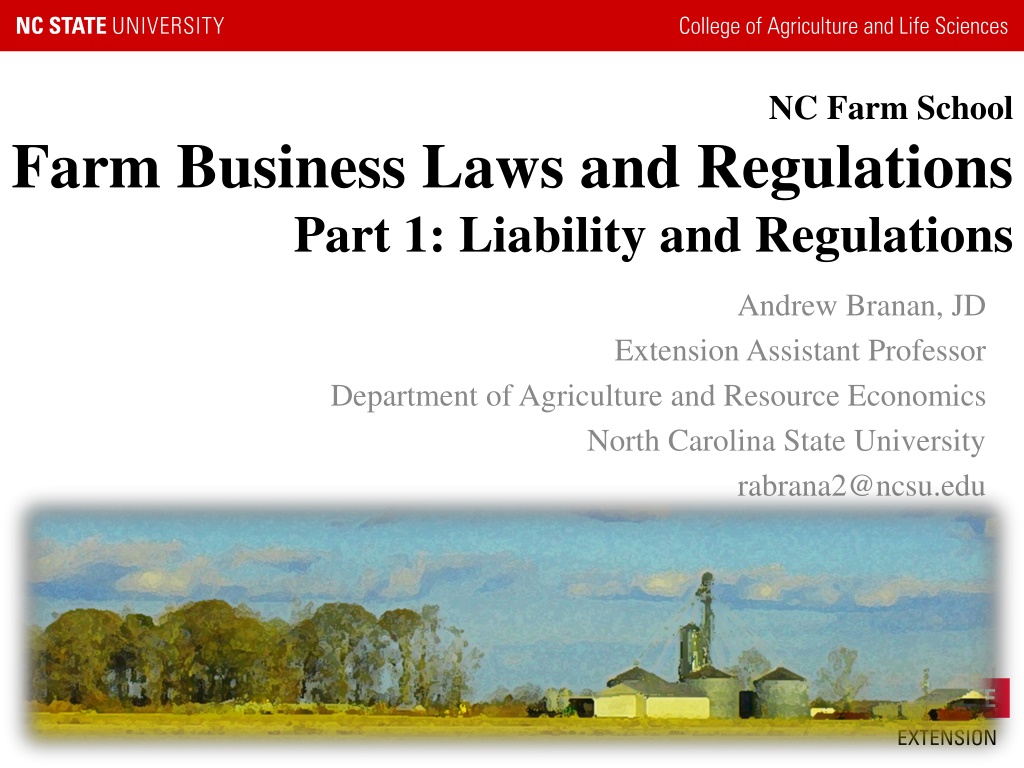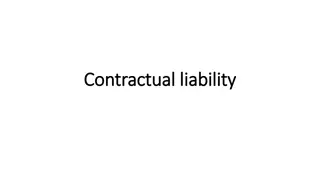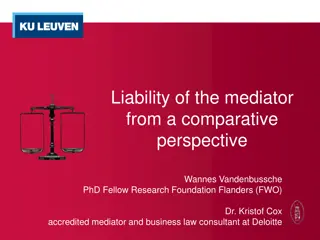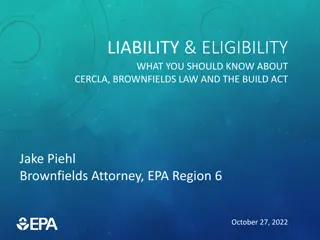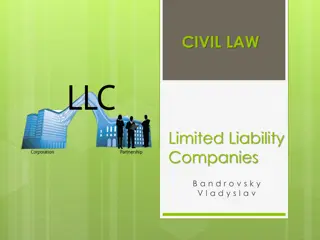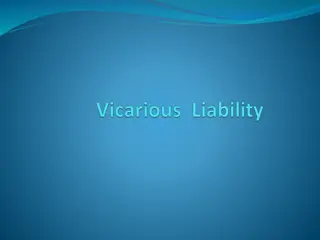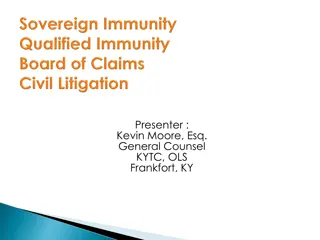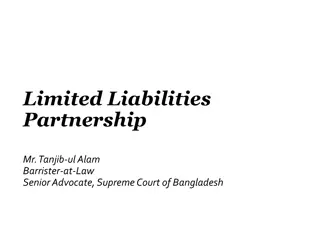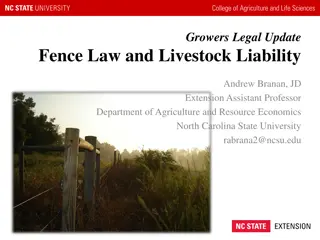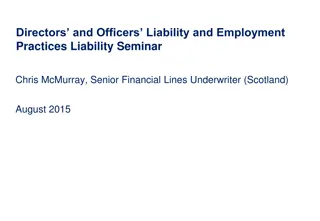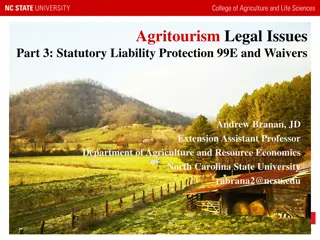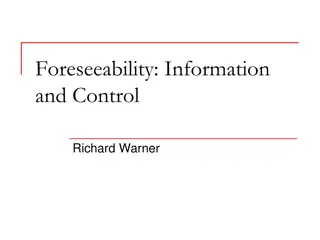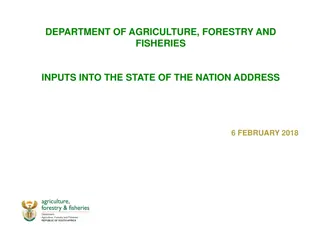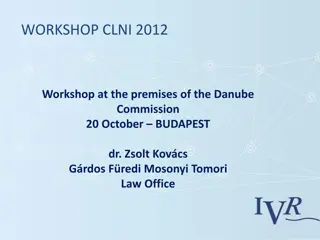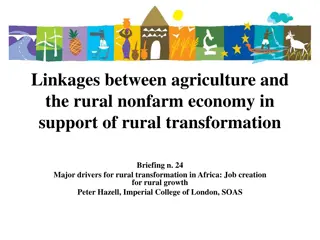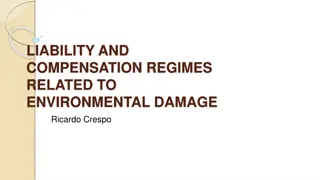Understanding Liability and Regulations in Agriculture
Agriculture in North Carolina encompasses a wide range of activities, including cultivation, livestock management, aquaculture, and more. This article explores the definitions of agriculture in state law, the concepts of liability and regulation in farming practices, and the importance of adhering to legal requirements to ensure safety, compliance, and sustainability in the agriculture industry.
Download Presentation

Please find below an Image/Link to download the presentation.
The content on the website is provided AS IS for your information and personal use only. It may not be sold, licensed, or shared on other websites without obtaining consent from the author. Download presentation by click this link. If you encounter any issues during the download, it is possible that the publisher has removed the file from their server.
E N D
Presentation Transcript
NC Farm School Farm Business Laws and Regulations Part 1: Liability and Regulations Andrew Branan, JD Extension Assistant Professor Department of Agriculture and Resource Economics North Carolina State University rabrana2@ncsu.edu
Agriculture Defined in State Law 106-581.1. Agriculture defined. For purposes of this Article, the terms "agriculture", "agricultural", and "farming" refer to all of the following: (1) The cultivation of soil for production and harvesting of crops, including but not limited to fruits, vegetables, sod, flowers and ornamental plants. (2) The planting and production of trees and timber. (3) Dairying and the raising, management, care, and training of livestock, including horses, bees, poultry, and other animals for individual and public use, consumption, and marketing. (4) Aquaculture as defined in G.S. 106-758. (5) The operation, management, conservation, improvement, and maintenance of a farm and the structures and buildings on the farm, including building and structure repair, replacement, expansion, and construction incident to the farming operation. (6) When performed on the farm, "agriculture", "agricultural", and "farming" also include the marketing and selling of agricultural products, agritourism, the storage and use of materials for agricultural purposes, packing, treating, processing, sorting, storage, and other activities performed to add value to crops, livestock, and agricultural items produced on a farm, and similar activities incident to the operation of a farm.
Liability vs. Regulation The concept of liability has been developed over hundreds of years in English Common law Concept of tort law (tort comes from the Latin torquere, to twist, tortus , twisted, wrested aside) Broadly means the wrong one does to another Concerns the redress of wrongs between individual parties, where one party is injured or loses property through the negligence of another The concept of regulation comes form our governments (federal, state, local) use of its Police Power : the obligation we place upon it to protect the general health and welfare of we the people Reserving of course certain individual rights guaranteed in US and State Constitutions
Liability vs. Regulation Liability Redress of and compensation for an injury when you owed another person a duty not to injure them Food safety sickness from raw or value-added product traced to you Personal injury (driving a tractor down the road) Personal injury when you invite someone to your farm Regulation Has been informed by tort law over the centuries, we know how injuries generally occur, so we ask the government to protect us Eliminate common injury for which no financial redress (other party has no money) the power to stop you backed up by criminal penalty Taxation: collect sales and property tax Zoning: regulating proximity of incompatible land uses Food Safety: ensuring foods are prepared safely to prevent illness Environmental regulation: clean water and air to prevent disease Natural Resource Conservation public good vs. private property right
Relationship between Liability and Regulation To prove liability, plaintiff must prove your negligence (burden of proof on plaintiff) Duty to make them safe Breach of that duty (you didn t make them safe) Proximate Cause (your breach caused their injury) Damages (the extent of their injury) Violating a regulation can shift the burden of proof (known as negligence per se) The regulation must be the type to prevent such injury Plaintiff must fall within class of people regulation was designed to protect
Protecting Your Business and Your Assets Liability Operating in a safe manner ( risk management ) Invitees vs. trespassers Duty to your food customers Insurance - pays damages and cost of defense Property insurance (auto, home, farm) Product liability insurance Professional liability insurance (service based, Business Entity (separation of personal assets from those that create the liability) Regulation follow the regulations! Government can stop you from operating, meaning no return on investment, no ability to repay debt, etc. Violation of a regulation helps a person s liability claim against you And you could lose your insurance You feel government has exceeded its authority? Recourse through litigation or political process
Liability Example: Agritourism Duty to your customers (invitees) to eliminate risk and make property safe (fencing off that bull, filling in that old well) Property Insurer (e.g. Farm Bureau) must know the scope of what they are insuring Policy rider (e.g. people are picking strawberries on your farm) NC Statutory Agritourism Liability Limitation (NCGS 99E) Post two signs that read: WARNING! Under North Carolina law, there is no liability for an injury to or death of a participant in an agritourism activity conducted at this agritourism location if such injury or death results from the inherent risks of the agritourism activity. Inherent risks of agritourism activities include, among others, risks of injury inherent to land, equipment, and animals, as well as the potential for you to act in a negligent manner that may contribute to your injury or death. You are assuming the risk of participating in this agritourism activity. Will not protect you from wanton negligence Has not been tested in NC appeals courts
Regulation Example: Zoning County Ordinance defines appropriate location activity Can I farm here? Can I invite customers to my farm here? (traffic) Can I have weddings in my barn here? Can I sell beer here? Can I operate a gun range here? Broad farming exemption in state law Issue: Getting a building permit from the County Bona Fide Farm status A-R Residential replacement?
Food Regulations Poultry Processing Meat Handling Value-added kitchen processing Egg Sales
On-Farm Poultry Processing 20,000 bird on-farm processing limit With the exception of mobile slaughter units, the facility used to slaughter or process the poultry is not used to slaughter or process another person s poultry unless the State Director of Meat and Poultry Inspection grants an exemption. Exemptions are still available until December 31, 2018
Meat Handling Any farmer who receives, stores, transports, and/or sells (wholesale or retail) NCDA (State) or USDA (Federal) inspected meat and/or poultry products must register as a meat and poultry handler with the NCDA&CS Read more at: https://growingsmallfarms.ces.ncsu.edu/growingsmallfar ms-meatandeggs/ Google: NC Choices CEFS program, lots of training on these topics
Egg Sales 106-245.15. Designation of grade and class on containers required; conformity with designation; exemption. No person shall market to consumers, institutional consumers or retailers or expose for that purpose any eggs unless there is clearly designated therewith on the container the grade and size or weight class established in accordance with the provisions of this Article and such eggs shall conform to the designated grade and size or weight class (except when sold on contract to a United States governmental agency); provided, however, a producer marketing eggs of his [or her] own production shall be exempt from this section when such marketing occurs on the premises where the eggs are produced, processed, or when ungraded sales do not exceed 30 dozen per week. Contact Jim Melvin the at the NCDA&CS Food and Drug Protection Division at 919-733-7366.
Home-Based Food Business Sales and Use Tax must obtain a state sales and use tax ID; there is no fee (raw farm products exempt) Food products are subject to a 2% sales tax throughout the state. For other products, depends on county and local Food processors without exemption are required to comply with the Good Manufacturing Practice requirements set forth in federal regulations GOOGLE: Part 110 Current Good Manufacturing Practice in Manufacturing, Packaging, or Holding Human Food Further: http://www.ncagr.gov/fooddrug/food/homebiz.htm
Bona Fide Farm Status - Zoning Exemption from County zoning restrictions Not an exemption from NC Building Code requirements Safe Harbors NCGS 153A-340 A farm sales tax exemption certificate issued by the Department of Revenue. A copy of the property tax listing showing that the property is eligible for participation in the present use value program pursuant to G.S. 105-277.3. A copy of the farm owner's or operator's Schedule F from the owner's or operator's most recent federal income tax return. A forest management plan FSA Farm Numbers no longer qualify
Bona Fide Farm - Agritourism A building or structure that is used for agritourism is a bona fide farm purpose if the building or structure is located on a property that (i) is owned by a person who holds a qualifying farmer sales tax exemption certificate from the Department of Revenue pursuant to G.S. 105-164.13E(a) or (ii) is enrolled in the present-use value program pursuant to G.S. 105-277.3. Failure to maintain the requirements of this subsection for a period of three years after the date the building or structure was originally classified as a bona fide purpose pursuant to this subdivision shall subject the building or structure to applicable zoning and development regulation ordinances adopted by a county pursuant to subsection (a) of this section in effect on the date the property no longer meets the requirements of this subsection. For purposes of this section, "agritourism" means any activity carried out on a farm or ranch that allows members of the general public, for recreational, entertainment, or educational purposes, to view or enjoy rural activities, including farming, ranching, historic, cultural, harvest-your-own activities, or natural activities and attractions. A building or structure used for agritourism includes any building or structure used for public or private events, including, but not limited to, weddings, receptions, meetings, demonstrations of farm activities, meals, and other events that are taking place on the farm because of its farm or rural setting.
Business Identity Entity Name vs. Assumed Name Secretary of State (SOS) filing County Register of Deeds filing Web URL ownership Trademarking SOS application ($75) Logo protection Product Mark vs. Service Mark US Federal Application
Farm Business Structure Liability Protection Separation of Personal and Business Assets Transfer of going concern Forms of Business Sole proprietorship (no formalities, unlimited liability) Partnership (General vs. Limited) Corporation Limited Liability Company
Use of Business Entities Liability protection (protect personal wealth, land) Contract between owners Income Management Equity Buy-Sell (Manage the D s: Death, Disability, Divorce, Disaster, Disagreement, Disengagement
Limited Liability Company Operating LLC (or S Corp) Partners contribute their ownership interest in cattle, bins, machinery, sweat etc. Use as transfer vehicle to farming heir (gifts/structured sale) Existing S Corp or Partnerships (merger, conversion, asset transfer, etc.) Land LLC Deed Land interest to the LLC (never a corporation) Restrict membership Strip partition rights inherit to real property interest Structured exit of equity in land (title substitute) Conversion of existing Limited Partnership (w/o retitle property) (SOS filing)
The LLC Operating Agreement A Contract between contributors of assets Restricts who can be members Member vs. Assignee Dictates voting requirements for decisions Manager Voting and Non-voting Units Dictates triggers for buy-sell Farming Heir Option to Purchase Who may buy and when Appraisal procedure Price and payment terms (seller finance option) For existing S Corps, use Stock Purchase Agreement
LLC Set-Up Tasks Sketch plan, get accountant and lender sign-off Form entity with Secretary of State (after Jan 1) Get EIN (tax ID) Open bank account Elect S form 2553? (save on payroll tax) Re-title over-road equipment with DMV Update Contracts (or record DBA s) Update FSA payment entities For Land, update PUV within 60 days
THANKS FOR INVITING ME! Robert Andrew Branan Assistant Extension Professor Department of Agriculture and Resource Economics North Carolina State University Campus Box 8109 4336 Nelson Hall Raleigh, NC 27695 rabrana2@ncsu.edu 919 515 4670
